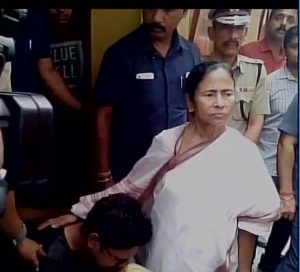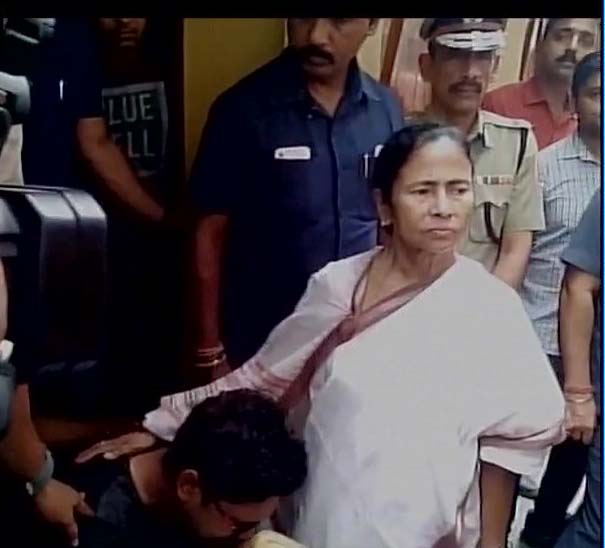 Janjivan Bureau / Darjeeling: Activists of Gorkha Janmukti Morcha (GJM) on Thursday torched at least five police vehicles and a traffic outpost, and broke through barricades, even as the state Cabinet meeting was held here during the day. The activists also fought pitched battles with the police and pelted them with stones, injuring 15 policemen, including a DIG. During the clash West Bengal chief minister Mamta Banerjee was presided over the cabinet meeting today here.
Janjivan Bureau / Darjeeling: Activists of Gorkha Janmukti Morcha (GJM) on Thursday torched at least five police vehicles and a traffic outpost, and broke through barricades, even as the state Cabinet meeting was held here during the day. The activists also fought pitched battles with the police and pelted them with stones, injuring 15 policemen, including a DIG. During the clash West Bengal chief minister Mamta Banerjee was presided over the cabinet meeting today here.
Police lobbed tear-gas shells to quell the violence by GJM supporters.
The GJM claimed at least 45 of its supporters, including women, were injured in police action. Panicky tourists tried to rush out of this picturesque northern West Bengal hill town.
The police, who initially beat a hasty retreat, made repeated baton charges and tear-gassed the mob near Bhanu Bhawan on the Mall Road in Darjeeling town that was virtually run over by the GJM workers.
The injured police officials included Deputy Inspector General of Police of Jalpaiguri range, Rajesh Kumar Yadav, who suffered a severe injury during the showdown with GJM supporters.
Morcha supporters also forced markets in neighbouring Kalimpong district to down their shutters.
The GJM workers, pressing for a separate state of Gorkhaland, also demanded a circular from the Mamata Banerjee government that it has no intention of “imposing” Bengali in the state’s hill areas.
The Cabinet meeting presided over by Chief Minister Mamata Banerjee on Thursday in Darjeeling town was the first in 45 years. After the meeting, the Chief Minister claimed the Morcha’s agitation was based on a “non-issue”.
“Every political party has the right to protest. So do they. But what is the issue on which this agitation is based? There are no issues at all. The Morcha is trying to gain political relevance by holding these protests,” Banerjee said.
“We have no enmity with anyone. We want the hills and the entire state to do well,” she added.
Later, the GJM called for a 12-hour shutdown in the north Bengal hills on Friday to protest what it said was “indiscriminate police action on peaceful demonstrators”.
The political temperature has soared in north Bengal hills after the GJM — the dominant force in the region for close to a decade — seized on Banerjee’s earlier announcement that Bengali would be a compulsory subject in schools across the state.
The GJM, itching for a confrontation with the ruing Trinamool Congress, which has emerged as its main political rival in the region, immediately hit the streets, dubbing the move as a bid to “impose Bengali in the hills” and revived the demand for separate Gorkhaland.
Banerjee on Monday tried to cool passions by announcing that “Bengali will not be compulsory in schools in Darjeeling hills and in certain areas of the Dooars and the Terai”.
She claimed the GJM was spreading lies about her government’s new three-language policy and threatened action against the Morcha-run Gorkhaland Territorial Administration’s board members in case a special audit revealed that state grants had been misused.
The demand for Gorkhaland—to be carved out of the northern Bengal hills—was first raised by the Gorkha National Liberation Front in the 1980s. The GJM nudged out the GNLF around 2008. The movement has left many dead in three decades, besides affecting the region’s economy based on tea, timber, and tourism.

















